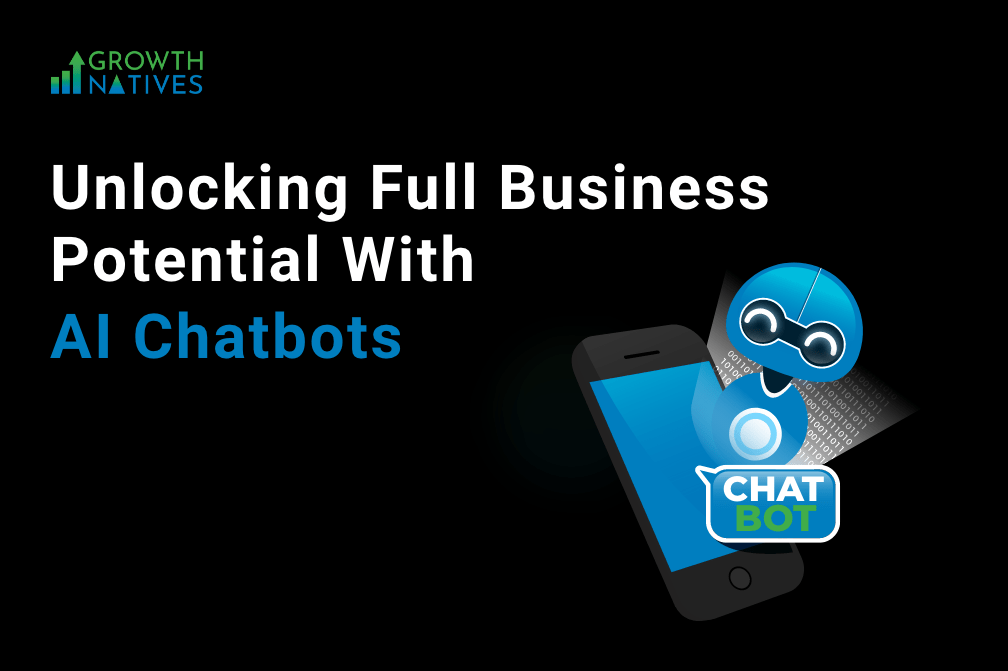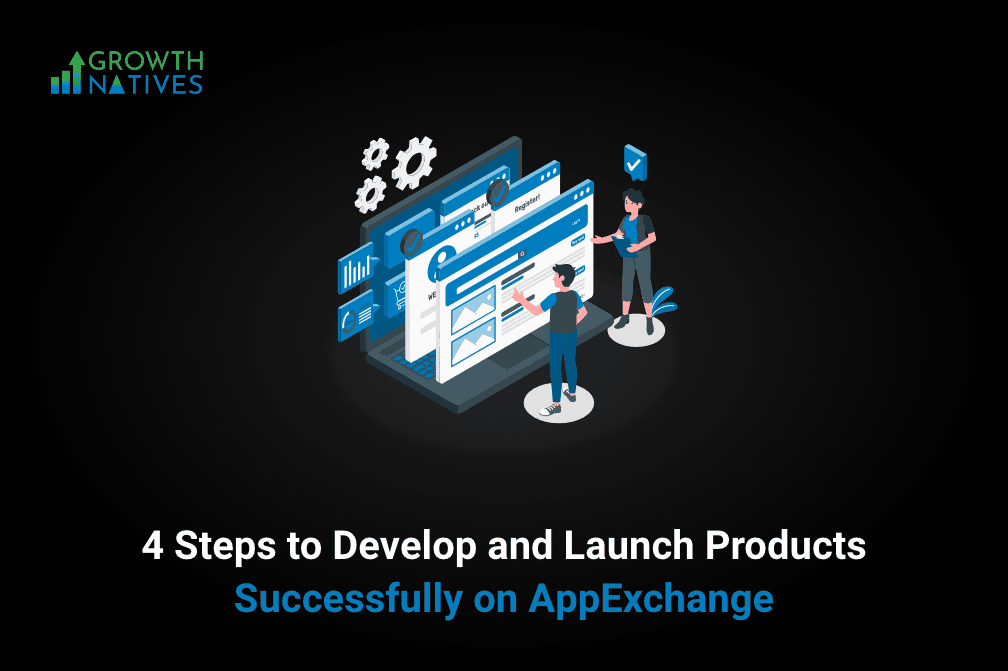Unlocking Full Business Potential with AI Chatbots

Table of Contents
In today's business world, it is all about being quick and responsive. With so many messages and communications coming in, it can be tough to keep up. And on top of that, standing out from the competition is a constant struggle. But what if we told you there's a way to make things easier?
Enter the power of AI chatbots. These little virtual helpers can take on a lot of the work for you, like seizing your customers' attention and pushing your brand to the top. No wonder the chatbot market size is expected to grow from $2.6 billion in 2019 to $9.4 billion by 2024 at a compound annual growth rate of 29.7%.
In this blog, we'll take a closer look at AI-powered chatbots and why your business needs them more than ever. But first, let's understand different types of chatbots.
Types of Chatbots
There are primarily three types of chatbots. These are:
- Rule-based Chatbots: These rely on predefined rules and options for users to interact with, providing limited selections and slower response times.
- Intellectually Independent Chatbots: They use machine learning to understand keywords and phrases and can improve their understanding over time.
- AI-powered Chatbots: These chatbots use a combination of machine learning, artificial intelligence, and natural language processing to understand and remember the context of the conversation and user preferences to provide more advanced and efficient responses.
What are AI Chatbots?
An AI chatbot is a type of chatbot that is powered by artificial intelligence. AI chatbots can understand natural language and can simulate human conversation. It can use advanced algorithms and machine learning to understand and respond to user inputs.
AI chatbots are typically pre-fed with texts, images, videos, and documents, which allows them to respond to a wide range of user queries. They can understand the intent behind the user's message and respond with accurate and relevant information.
AI chatbots are more advanced and efficient than traditional rule-based chatbots, making them a popular choice for businesses looking to automate customer service and improve customer engagement.
When integrated with your website, it acts like a virtual assistant that can handle millions of customer interactions and efficiently respond to each one simultaneously.
Think about it; your chatbot can be the one-stop-shop for all your business's problems, from scheduling appointments to answering customer queries and storing all their details in your database.
With AI-powered chatbots, you can:
Be available 24/7: AI-powered chatbots are available at all times, so your customers can receive help whenever they need it.
Save time and money: By automating repetitive tasks, AI chatbots can help you save time and resources, freeing your staff to focus on more crucial tasks.
Handle a high volume of clients: AI chatbots can interact with multiple customers simultaneously, providing efficient and personalized service to each one.
Streamline appointment booking: These chatbots can help automate scheduling and rescheduling appointments.
Provide real-time responses to frequently asked employee questions: You can train AI chatbots to provide quick and accurate answers to commonly asked questions by employees.
Process data faster: They can process large amounts of data quickly and accurately to help businesses make informed decisions.
Personalize the customer experience: With AI, chatbots can remember previous interactions and preferences and tailor the conversation to the customer's needs.
Cost-effective: Chatbots can handle multiple tasks and conversations simultaneously, providing a cost-effective alternative to hiring more human agents.
Help to increase sales and revenue: By providing quick and accurate responses to customer queries, chatbots can help increase sales and revenue.
Example of AI Chatbots
Many tech giants are investing heavily in the research and development of AI chatbots, which aim to merge human emotions with technology. For example, businesses worldwide use over 300,000 Facebook Messenger chatbots to engage with FB's 1.3 billion users.
Google's MEENA chatbot is trained with a massive 2.6 billion parameters and 341 GB of data, allowing it to respond to conversations sensibly.
JP Morgan Chase has developed a chatbot called Coin, which analyzes complex contracts and has saved over 360,000 hours of manual labor.
In the healthcare industry, chatbots like Health Coach and Bump assist patients and expecting mothers with their healthcare routines and appointments.
Benefits of AI Chatbots
According to Business Insider, 80% of businesses plan to include chatbots in their systems. And it's no surprise. There are several benefits of having AI chatbots, some of which we will discuss below.
1. Accurate Data Collection
Data collection is an important aspect of using chatbots for customer support. Chatbots can collect valuable data from customer interactions, such as their preferences, pain points, and feedback, to improve the customer experience.
By analyzing the data, businesses can gain insights into customer behavior and use it to make strategic decisions. For example, chatbot data can help identify common customer issues, allowing companies to address them and improve their products or services proactively.
Chatbots can also help businesses understand which features are most popular and which ones are not, thereby influencing product development decisions. Additionally, by understanding customer preferences and pain points, businesses can better tailor their marketing and sales efforts to target a specific audience.
2. Boost Productivity
Chatbots can help businesses increase their productivity and efficiency. By automating low-value tasks, chatbots can free up employees so they can focus on more critical tasks that add value to the company. They can also help reduce the calls and email volume, saving a lot of productive hours.
Chatbots can answer simple customer questions and direct them to the correct department, thus reducing the load on human customer service representatives. Integrating it with other systems and software, such as CRM, provides complete visibility to managers and delivers a personalized customer experience.
3. Humanizes Your Brand
One of the benefits of using chatbots is that you can customize them to have a "personality" that aligns with your brand. It allows businesses to use chatbots for various purposes, such as technical support, sales information, or account management.
For example, Domino's Pizza gave their customer service chatbot, "Dom," a friendly personality that makes the ordering process easy and enjoyable. This chatbot approach can help humanize your brand and build better customer relationships.
It also helps to alleviate any concerns that customers may have about interacting with chatbots. Overall, giving chatbots a "personality" that aligns with your brand voice can help to create a more personal and enjoyable customer experience.
4. Helps Grow Your Business
Chatbots can help you grow by reaching more people and increasing your customer base. They can help to improve and expand nearly every aspect of your business, from marketing to sales to customer service.
Chatbots can help to improve customer engagement by providing personalized interactions with consumers and offering reliable shopping recommendations based on their buying history and preferences. They can also help to guide prospects through the sales process, answering questions and helping to move them further down the marketing funnel.
AI chatbots can predict customer behavior, which means you can send relevant notifications to the right people at the right time. Additionally, chatbots can broaden your reach by interacting with many prospects via social media, which is more efficient than humanly possible.
Many businesses use social media bots to interact with customers, such as Uber, allowing customers to place their orders through Facebook Messenger. It also helps with lead generation and provides a personalized customer experience.
5. Improves Customer Experience
Today's customers prefer the self-service model, whether getting a burger at a nearby fast-food restaurant, ordering a ride with Uber, or ordering food online. And that is why businesses need to be on chat platforms.
AI-powered chatbots can help businesses provide excellent customer service by being an interactive version of their FAQ page, answering common customer queries, and being available 24/7.
Implementing a chatbot service can help small businesses to improve customer engagement and provide efficient customer support. Chatbots can also replace customer support executives and redirect out-of-context or specific queries to the support team.
They offer instant responses to customers' questions, eliminating the need to wait in a queue. Chatbots can also reduce human error and quickly resolve customer issues compared to traditional customer service systems.
Bottom of Form
How to Get Started with Chatbots
To get started with chatbots, you should:
Define your goals: Determine what you want to achieve with your chatbot, such as improving customer service, promoting new products, or generating more leads.
Understand your audience – Studies suggest that around 48% of users online want a bot with a personality tailored to their needs. Having a chatbot with a tailored personality that aligns with your target audience's needs and wants can significantly improve the user experience.
Choose a platform - Several chatbot platforms are available, such as Dialogflow, Botkit, and ManyChat. Each has its own features and advantages, so choose the one that best suits your business needs.
Design your chatbot - Once you have chosen a platform, you can start designing your chatbot. This includes creating conversation flow, adding functionalities, and integrating it with other systems and software such as CRM.
Test and train your chatbot: After designing the chatbot, test it to ensure that it is working correctly and make necessary adjustments. Train the chatbot by feeding it with relevant data and test scenarios.
Implement and monitor - Finally, implement your chatbot on your website or messaging platforms. Monitor the performance of the chatbot and make necessary adjustments. Collect feedback from customers and make improvements as needed.
You can also integrate chatbots with other technologies, such as Natural Language Processing (NLP) and machine learning (ML), to make them more sophisticated and efficient, keeping ethics and legal compliance in mind.
Parting Thoughts
In conclusion, AI-powered chatbots can be a valuable asset for businesses looking to improve customer engagement and support. With the ability to provide personalized interactions, instant responses, and 24/7 availability, chatbots can help to reduce human error and improve overall customer service.
For businesses looking to get the best results, it is recommended that you reach out to a professional agency such as Growth Natives to guide you through the process and ensure that your chatbot is based on your specific needs.
Get in touch with one of our experts and take your business to the next level.
Author Box
Sakshi Arora
Sakshi Arora is a seasoned content writer and editor with extensive experience across various industries including B2C, B2B, travel, e-commerce, and IT. In her free time, she enjoys expressing her creative side through painting and writing poetry. She also finds solace in nature and has a deep spiritual connection. Music brings her immense joy.




